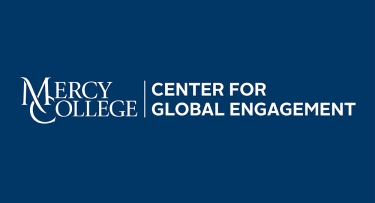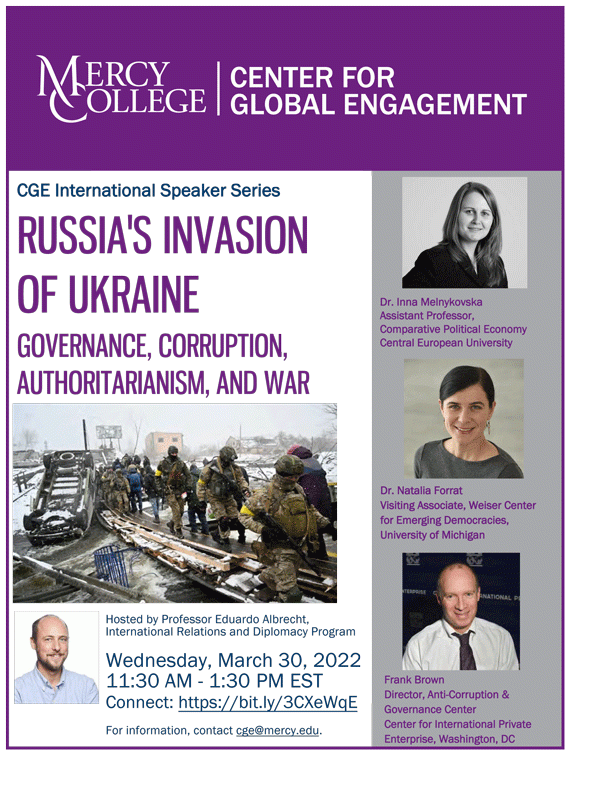
On March 30, the Mercy College Center for Global Engagement (CGE) hosted a virtual panel to discuss the Russian invasion of Ukraine. The well-attended event featured three panelists who approach this important topic from their respective disciplines of economics, sociology, business and journalism.
The panelists were Inna Melnykovska, Ph.D., assistant professor of comparative political economy at Central European University; Natalia Forrat, Ph.D., visiting research associate at the University of Michigan’s Weiser Center for Emerging Democracies; and Frank Brown, director of the Anti-Corruption and Governance Center at the Center for International Private Enterprise in Washington, D.C.
Beyond their work, each panelist has a deep personal connection with Ukraine or Russia. Melnykovska is originally from Ukraine, Forrat is originally from Russia and Brown lived in Russia while working as a journalist and has visited Ukraine for the past 25 years.
After opening remarks by Saul Fisher, Mercy College associate provost for research, grants and academic initiatives, Eduardo Albrecht, Ph.D., director of Mercy’s International Relations and Diplomacy Program, gave a lecture on the recent history of Crimea and Ukraine to provide attendees with relevant context for the subsequent presentations. To close his remarks, he raised big questions about the future of Ukraine and the world, including, “Has this war inaugurated a new phase in world history where nuclear weapon-holding states outside the Atlantic Alliance are emboldened to use war as a policy tool?” and, “Can sovereign democratic countries no longer elect to determine their own political and military alliances?”
Melnykovska discussed how economics can help explain why Russia invaded Ukraine. She sees the invasion as a war against liberal ideas that could transform Russia’s economic system of governance. While economic sanctions might push Russian businesses closer to the regime in the short term, she believes that it is very possible that these sanctions succeed in the longer term.
Next, Forrat discussed public opinion and the anti-war resistance within Russia. She reported that as the war continues, the number of Russians who disagree with the war is increasing, but they are afraid to voice their opinions publicly for fear of punishment. Though many resistance leaders were jailed in the fall, Russians are still finding ways to show their resistance, including subtle flash mob-style demonstrations and leaflet distribution.
Brown shared his observations that Ukrainians have a high tolerance for uncertainty and chaos while pursuing democracy, which is driving them to defend their country now. One way that Russian President Vladimir Putin is justifying the invasion to the Russian people is by positioning Ukraine as a threat to Russian Orthodox values. Though tempting, Brown warned that we must not succumb to wishful thinking that the Russian people will rise up to depose Putin and that the oligarchs will bend under the sanctions, as that kind of thinking led the United States into misadventures in Iraq and Afghanistan.
“This was a brave event for Mercy to organize,” said Albrecht, who also moderated the panel. “It puts Mercy on the map in terms of leading conversations on this very important, timely topic.” Over the years, the Center for Global Engagement has hosted many panels and events—on topics such as refugees, COVID-19 and climate change—that have become respected sources of knowledge for those seeking deeper insight into major global issues.
The recording of the March 30 panel on Russia’s invasion of Ukraine is available here using the password 5WZ?A4%e

